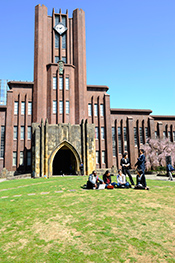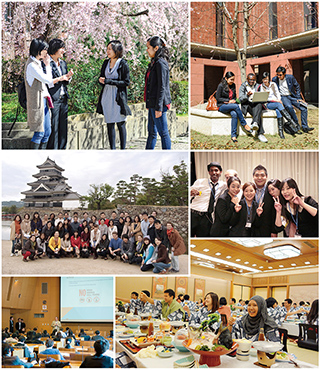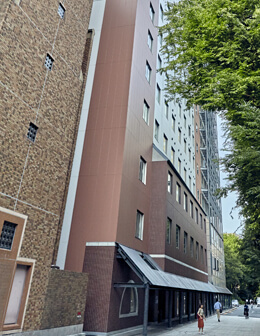JDS中国项目概述大学信息

- URL of Graduate School (English)
- http://www.pp.u-tokyo.ac.jp/en/
- Name of Course/Program
- Department of Public Policy, Master of Public Policy,
International Program (MPP/IP) - URL of Course/Program (English)
- http://www.pp.u-tokyo.ac.jp/en/mppip/
- Degrees
- Master of Public Policy
- Credit and years needed for graduation
- 46-course credits for two years
Features of Graduate School
The University of Tokyo’s Graduate School of Public Policy (GraSPP) was established in 2004 as a joint initiative of the Graduate Schools for Law and Politics and the Graduate School of Economics to offer a Master of Public Policy (MPP) degree. GraSPP aims to train students in planning, implementing, and evaluating public policy and to prepare students for careers as public policy professionals.
Many graduates from The University of Tokyo become prominent public and private sector leaders to address modern-day challenges in an ever-changing world effectively. With this tradition of excellence, GraSPP offers an innovative approach to educating future global leaders joining from all over the world.
GraSPP’s educational program is designed on a two-pillared foundation combining theory and practice and offers a multidisciplinary curriculum of law, politics, and economics. GraSPP has a mission to bridge the gap between academic learning and public policy practices with international perspectives.
Faculty
GraSPP’s faculty consists of academics, who provide intellectual foundations, and policy practitioners, who share professional knowledge and experience with students.
Features of the Course/Program

Overview of the Program
The two-year Master of Public Policy, International Program (MPP/IP) at GraSPP offers an extensive and diverse menu of courses taught in English. The program provides future global leaders with an opportunity to learn cutting-edge multidisciplinary approaches to addressing current public policy challenges. The MPP/IP is designed for those aspiring to be globally competitive public policy practitioners with professional knowledge and practical capacities. MPP/IP students have access to courses offered by other graduate schools at The University of Tokyo.
MPP/IP applicants are required to choose one of the following policy streams and expected to demonstrate basic competence for learning law, politics, and economics.
1) Economic Policy, Finance and Development (EPFD)
2) Public Management and International Relations (PMIR)
Features of the Master’s Program
1) International Atmosphere and Networking Opportunities with Future Global Leaders
GraSPP is one of the most cosmopolitan graduate schools in Japan. About 50% of the student body is composed of international students from over 30 countries (both advanced and emerging economies). Student backgrounds are equally diverse: many of them have just completed undergraduate studies while others are professionals from a variety of fields in the public and private sectors. About half of the courses are offered in English. MPP/IP allows students to earn a master’s degree by taking courses offered in English. Studying with international classmates forms strong friendships and helps maintain global professional networks going forward.
2) Multidisciplinary Curriculum
MPP/IP builds a foundation of professional knowledge and practical skills necessary to successful careers in government, business, international organizations and NPOs. The core curriculum is multidisciplinary, consisting of law, politics, and economics. Combined with case studies and practical training courses, the program prepares individuals to design, plan, implement, and evaluate policies.
3) International Compatibility
The internationally compatible curriculum enables international student exchange with fourteen partner universities. Students at both GraSPP and partner schools share the learning opportunities while nurturing friendships and experiencing each other’s culture.
4) Extra-curricular Opportunities
Besides a world-class education, GraSPP offers students with opportunities to brush up skills and make valuable connections with their peers and professionals through international events, internships, and other activities.
Necessary Curriculum to Obtain the Degrees
Courses taught through English language for the 2024 academic year (English Course)
Core and elective core courses for respective streams (PMIR, EPFD) are available on our website.
https://www.pp.u-tokyo.ac.jp/wp-content/uploads/2023/03/e_04-Completion-Requirements2023.pdf
To learn more about each course details (syllabus, professor, schedule, credit etc.), please also visit our website.
GraSPP courses
http://www.pp.u-tokyo.ac.jp/en/education/courses/
GraSPP courses taught in English
https://www.pp.u-tokyo.ac.jp/wp-content/uploads/2016/01/e_11-English-taught-courses2023-0327.pdf
Classification of GraSPP courses taught in English
http://www.pp.u-tokyo.ac.jp/wp-content/uploads/2016/01/AY2019-Classification-of-Courses-on-Policy-Issues.xlsx
The University of Tokyo Online Course Catalogue
https://catalog.he.u-tokyo.ac.jp/
List of Faculty members capable of guiding JDS China Fellows and their Research Specialties
While GraSPP does not adopt the supervisor system, students, including of JDS China fellows, can request a faculty member to be a supervisor in writing a thesis or a research paper.
You can find more details on how to write a thesis and research paper on our website.
Thesis: https://www.pp.u-tokyo.ac.jp/en/student-bulletin/2023-05-24-42654/
Research Paper: https://www.pp.u-tokyo.ac.jp/en/student-bulletin/2023-05-24-42666/
Academic Schedule

- GraSPP Academic Calendar AY2023
- https://www.pp.u-tokyo.ac.jp/wp-content/uploads/2016/01/ay2023-academic-calendar.pdf
- The University of Tokyo Academic Calendar AY2022
- https://www.u-tokyo.ac.jp/en/current-students/university_calendar.html
Facilities (ex: Library, PCs, Gymnasium etc.)
Libraries
The University of Tokyo Library System is composed of about 40 libraries, including the General Library, the Komaba and the Kashiwa Libraries, and departmental libraries. The General Library is the system‘s main coordinating body. Each faculty / institution library has a large number of materials in their specialized fields.
https://www.lib.u-tokyo.ac.jp/en
International Student Support Room (ISSR)
International Student Support Room (ISSR) provides advice to international students (including families) regarding their concerns and problems as well as their careers. In addition, it provides the FACE Program, a program that brings together international students with Japanese volunteers for "face-to-face" interaction. For more information, please refer the site below.
https://www.u-tokyo.ac.jp/adm/inbound/en/support-issr.html
Gotenshita Memorial Arena
At the Hongo Campus, the" Gotenshita Memorial Arena" can be used for table tennis, badminton, futsal, volleyball, basketball, and swimming. It also has training equipment that can be used. One-day ticket is 300 yen per user.
http://www.undou-kai.com/goten/e/home.html
Advice for our Graduate School Applicants
1) MPP/IP seeks to nurture individuals who aspire to take active roles as public policy professionals and leaders with high ethical standards in international society utilizing specialized knowledge and practical competencies.
2) High English language proficiency
- Applicants must submit the test score taken within two years of the application submission date of either TOEFL (Official Score Report) or IELTS (Test Report Form) as a proof of English proficiency.
- The English proficiency test score exceeding TOEFL iBT 89 or IELTS 6.5 is desirable but the score of TOEFL iBT 100 or IELTS 7.0 may give a better chance of admission.
3) Academic background
- The applicant must hold a bachelor’s degree or its equivalent from an accredited university.
- The applicants are expected to demonstrate basic competence for learning law, politics, and economics.
4. Admissions Information
http://www.pp.u-tokyo.ac.jp/en/mppip/admissions/general-information/
5. Other Useful Links
GraSPP website for International Students: http://www.pp.u-tokyo.ac.jp/en/current-students/international-students/
International Student Handbook 2023: https://www.u-tokyo.ac.jp/content/400009999.pdf


